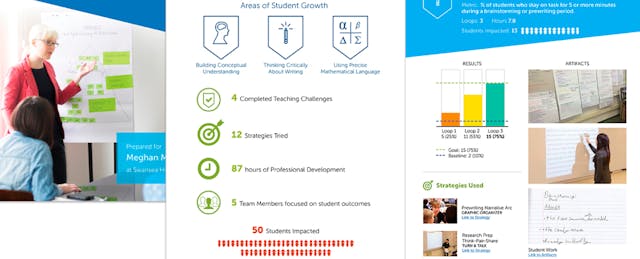Like the students they teach, educators need personalized support to grow. And they’ll get that support, not from sitting in classrooms or conferences, but through interacting with coaches and mentors.
That idea has fueled a $6 million Series A round for BetterLesson, based in Cambridge, MA. Investors include Reach Capital, New Markets Venture Fund, Dell Foundation, Scott Cook (co-founder and CEO of Intuit) and his wife, Signe Ostby.
Cook also invested$1.8 million in a bridge round in 2014 to help the company develop a new professional development service,TeachCycle. His return for a new funding round is a strong vote of confidence that the tools has legs and is ready to scale, says Alex Grodd, co-founder and CEO of BetterLesson.
TeachCycle offers a three-step process (Teach-Measure-Learn) for how teachers can try out new strategies, collect data and measure effectiveness, and reflect with their coaches on what they’ve learned. This framework is the foundation forPersonalizedPD, the name of BetterLesson’s updated professional development product that offers more features.
Here’s how it works. Based on their instructional profiles and experience, teachers are paired with personal coaches who help set professional development challenges and objectives. They meet online every other week for 45 minutes, during which coaches will offer tips, feedback and strategies for improvement. In between these meetings, teachers share videos, students’ work and other evidence to show how they’ve implemented strategies. There’s a PersonalizedPD app that serves as a digital portfolio for teachers to capture and share their progress.
Founded in 2008, BetterLesson first assembled a library of free, online lesson plans. But this alone “was not sufficient to change [teaching] practice, Grodd told EdSurge in 2015. Still, more than 400,000 teachers use these resources and “they’re a great lead generation source,” he adds. Some of these lesson plans and teaching strategies are recommended to teachers who use the PersonalizedPD service.
So far, BetterLesson has closed deals in more than 24 U.S. districts, and also partnered with National Education Association, the country’s largest union, to use PersonalizedPD in another 78 districts. The company charges districts an annual fee based on the number of teachers using the service.
Helping teachers improve, Grodd says, is “ultimately about changing entrenched adult behavior.” He’s candid about why the current state of K-12 professional development isn’t delivering what teachers want. “One conference, webinar or online course is never going to change adult behavior in a meaningful and lasting way.”
His dissatisfaction is not entirely unfounded. According to areport from the nonprofit TNTP, districts on average spend $18,000 per teacher for professional development every year. But less than half of teachers say these experiences were relevant or useful. These costs—funded by taxpayers—add up; TNTP estimates that the top 50 districts in the U.S. spend $8 billion on teacher development. The Gates Foundation estimates (PDF) that $18 billion is spent annually in the U.S. for K-12 professional development.
“What everyone agrees on is that there’s not much return,” says Grodd.
That’s a lot of waste—and a lot of room for companies like BetterLesson to play in. The Cambridge, MA-based company isn’t alone; other tools offered by companies including Knowledge Delivery Systems, Insight Education Group and TNTP promise to connect teachers with external mentors.
“There is a massive market and social opportunity,” Grodd tells EdSurge. Expect the company to grow its current staff of 33 full-time employees, which includes 10 instructional coaches.
With this round, BetterLesson has raised $11 million in equity funding. The company has also received $4.25 million in grants from the Gates Foundation and The Learning Accelerator.


